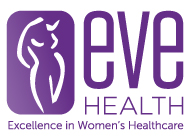Celebrating Women’s Health Week
This years theme for Women’s Health Week, is ‘Your Voice… Your Choice’ and here at Eve Health we will be following the Jean Hailes program shining a light on a different topic each day of the week. Below you will find resources, videos from our clinical team and checklists to help ensure your health is top of mind.
Monday 2 September - KNOW YOUR BODY
Know your body and health checks
Your health should be a top priority, and you play a crucial role in advocating for yourself. It’s vital to schedule routine check-ups and understand your own body. Additionally, make sure to discuss and schedule the necessary tests and screenings with your healthcare provider on a regular basis.
Depending on your age some of these tests include;
- Breast checks / mammogram
- Bowel cancer screening test
- Cholesterol blood test
- Skin check
- Bone density screening
At Eve Health, our focus is on highlighting the essential gyanecological screenings that all women should undergo. Below is a detailed explanation of cervical screening to provide the necessary information and support on the process.
Cervical Screening Tests
Regular cervical screening tests are your best protection against cervical cancer. If you are a woman aged 25 to 74, and haven’t had a cervical screening test yet, it’s recommended you do so as soon as you can.
The cervical screening test is one of the most advanced tests in modern medical science, and because it reduces the rates of cervical cancer, it is free for Australian women.
Watch this video as our Gynaecology Nurse, Rebecca Lark talks all things cervical screening, explains what the HP Virus is and explains the self collection test.
Tuesday 3 September - COURAGEOUS CONVERSATIONS

How to have uncomfortable conversations with your Doctor / Specialist?
It is never easy to discuss uncomfortable matters about your personal health with anyone, but bringing them up with your doctor is vitally important, as it has to do with your health.
When seeing one of our specialists here at Eve Health, they will have already received a referral from your GP; however, they still need to hear what has been going on from you, their patient.
Whether it be heavy periods, pain during sex, you feel something is not quite right or hormonal challenges, we have some tips below to help you navigate these challenging and sometimes difficult conversations:
Understand the potential if you don’t ask your question
No matter how uncomfortable, don’t be tempted to skip or gloss over important information or symptoms you might be having, as doing so could come at the cost of your health.
You will not be judged
Your doctor has most likely heard it all before, so don’t be embarrassed to give all the details of your concern/issue; they will not judge you. While you may feel that sharing all your most intimate details of your health concern is the hardest thing to do in your day, it is a part of their job to hear it.
Come prepared
Make sure you are prepared with notes, your concerns, and track your symptoms—basically, have everything ready to go to discuss with your doctor.
Cover everything
Although it might be awkward, embarrassing, or difficult to bring up, being as direct and to the point and even letting your doctor know it is embarrassing might help to make it a little less uncomfortable for you. Saying things like ‘this is a little uncomfortable to say/show you.’ Also, don’t worry about using medical language; just say it in your own words, being specific about your symptoms and how long they have been going on.
Remember, your health and well-being are paramount, and your doctor is there to help you. Taking these steps can make difficult conversations a little easier and ensure you get the care you need.
Wednesday 4 September - SHAME AND STIGMA
Discussing the ‘Taboo’ – Infections, Painful Sex and Sexually Transmitted Infections (STI’s)
In the world of Women’s Health there are certain conditions and infections that can be uncomfortable or even ‘taboo’ to discuss. This Women’s Health Week, we aim to address these issues, providing information on where to access resources and seek assistance when dealing with these sensitive topics.
Let’s start by addressing some of the most common concerns.
Thrush / Bacterial Vaginosis (BV) are both common conditions that affect the vagina and vulval areas but often go undiscussed due to embarrassment. These infections are nothing to be ashamed of and are very common and sometimes caused by a variety of reasons and can be treated effectively with the right medical advice.
Painful sex can have a significant impact on a woman’s self-perception, sexual satisfaction, and relationships. Some women may feel hesitant to address this issue, unsure where to seek help, or believe that ignoring it will make it disappear. Regrettably, delaying addressing the problem often leads to worsening symptoms. Taking the courageous step of talking to someone about it is crucial.
For more details on painful sex, please visit our dedicated information page – click here.
Sexual health is also a crucial but often overlooked topic. Conditions like sexually transmitted infections (STIs) can be a source of great anxiety and stigma. Some STIs are asymptomatic, leading to unknowing transmission. While some infections clear up on their own, others persist and can be transmitted to other partners. Most STIs are treatable with proper care, but untreated ones can have severe long-term consequences.
The Queensland Health Website has a range of information regarding women’s health. From reproductive health and pregnancy to menopause and general wellness, the site provides comprehensive guides, expert advice, and useful tools to help women make informed decisions about their health.
Thursday 5 September - POINT OF DIFFERENCE
Pelvic pain is one of the most common pain points a woman might face in her life.
Pelvic pain can be short term and be more attributed to period pain or can be more chronic and persistent. For today’s theme of Women’s Health Week we will focus on persistent pelvic pain, why it occurs and what you can do about it.
Persistent pelvic pain (PPP) is pain that lasts for more than six months and affects one in seven women.
It can be difficult to treat PPP and it is estimated that one in five women will have recurrence of symptoms within five years.
There are a number of primary pain factors that may result in PPP. These include;
- endometriosis,
- adenomyosis
- infections.
While pain usually indicates a specific injury to some part of the body, PPP is very different. Often the initial problem is addressed, or the severity of the symptoms lessened, but the pain persists because of changes to the nervous system, muscles or other tissues. For instance, you often feel muscles tense when you have been injured around the area of trauma. Similarly, local disturbances occur in the pelvis, affecting the bowel, bladder, muscles, connective tissue and nerves of the pelvis (the secondary pain factors). Often these secondary factors become the predominant problem, overshadowing the original disease process which may no longer be detectable.
The symptoms of PPP are variable and do not always correspond to the severity of disease. Symptoms may include pain with periods, ovulation or intercourse, pain when passing urine or opening bowels, or lower back pain.
We sat down with Associate Professor Anusch Yazdani and Nursing Team Leader, Sam Costa to talk all things pelvic pain.
Watch this video to learn more.
Friday 6 September - TRUST YOUR GUT

Healthy Eating
Healthy eating can have a significant positive impact on your physical and mental health. It can also positively effect gynaecological conditions such as endometriosis, and fertility.
We have developed some tips to help with your diet and overall nutrition.
Food to Try when battling Endometriosis
From current research, foods that may help to improve symptoms in women with endometriosis include:
- Omega 3 fats. Good sources of omega 3 (which is anti-inflammatory) is found in olive oil, fish, nuts and seeds.
- Antioxidants in whole foods. Antioxidants reduce the amount of oxidative stress and inflammation in the body. Foods high in antioxidants such as vitamin C include oranges, berries, spinach, broccoli, mangoes and kiwi fruit. Foods high in vitamin E include avocados, nuts, seeds and some grains. The message is to eat a rainbow!
- Getting adequate fibre helps to excrete excess oestrogen, which can be inflammatory and worsen endometriosis symptoms. Having a regular bowel movement can also help to decrease bloating, pain and IBS-like symptoms. Aim for a diet with at least 25g of fibre per day such as fruits, vegetables, nuts, legumes and grains.
Foods that you may want to consider avoiding are:
- Trans-fats which are found in highly processed foods and refined seed oils, as these induce an inflammatory response in the body.
- Palmitic acid which is a fat found in red meat, has been linked in some studies to increased rates of endometriosis. Cutting down on red meat may be helpful.
- High GI foods and refined sugar both increase insulin and inflammation in the body which may worsen symptoms.
- Dairy -Some studies have shown a link between dairy and increased pain but others have not. It can be inflammatory due to a particular protein in cow’s dairy and can also contain high amounts of hormones such as oestrogen.
- Gluten and/or wheat can be inflammatory and worsen gut symptoms in women with endometriosis. Foods containing wheat or gluten may impair the gut lining and possibly affect the immune system which may have an impact on endometriosis symptoms in susceptible women.
- Pesticides on fruit and vegetables which contain dioxins has not been positively associated with endometriosis but these pesticides do interfere with hormonal pathways. Include more organic produce and ensure that fruit and vegetables are washed before eating to reduce this exposure.
- Some women with endometriosis and IBS symptoms may benefit from a low FODMAP diet for a period of time.
Keeping a healthy body when going through fertility treatment or trying to conceive
Eat Well
There are no surprises that if you eat well, you feel well. A well-balanced diet means incorporating the five food groups of vegetables and legumes, fruit, grains and cereals, lean meats and dairy sources, and limiting or avoiding foods high in added sugar. Diets with the correct balance of macronutrients (carbohydrates, proteins, and fats) are best and it’s essential that micronutrients (vitamins and minerals) are also being covered for optimal function. Women who are wanting to become pregnant should supplement their diet with folate and ensure their Vitamin D and iodine needs are being met. Zinc is an important nutrient for men to help support healthy sperm function. For both men and women, a diet high in anti-oxidants is beneficial.
Kick cigarettes / vaping in the butt
Toxins from cigarettes damage eggs, age ovaries, and interfere with the fertilisation and the implantation process. While smoking reduces fertility, when cigarettes are cut out, some of this function returns. For men, smoking can affect the development, quality and number of sperm. See your doctor for more information on quitting smoking or visit www.quitnow.gov.au.
Comments are closed.

